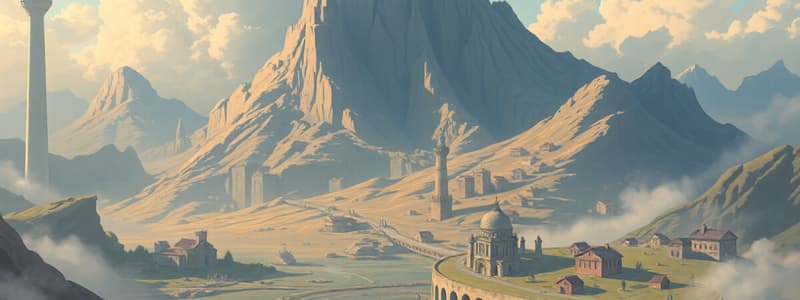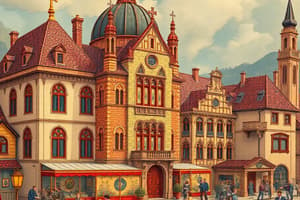Podcast
Questions and Answers
Which branch of geography focuses on climate and ecosystems?
Which branch of geography focuses on climate and ecosystems?
- Physical Geography (correct)
- Applied Geography
- Human Geography
- Cultural Geography
What is a primary characteristic of realism in international relations?
What is a primary characteristic of realism in international relations?
- Focus on economic cooperation
- Emphasis on legal institutions
- Importance of identity and ideas
- Power politics and national interests (correct)
Which ethical theory emphasizes the importance of duty and rules?
Which ethical theory emphasizes the importance of duty and rules?
- Utilitarianism
- Deontology (correct)
- Consequentialism
- Virtue Ethics
Which era is characterized by the study of empires and feudalism?
Which era is characterized by the study of empires and feudalism?
What key aspect of society deals with norms and social movements?
What key aspect of society deals with norms and social movements?
Which form of art includes dance and music?
Which form of art includes dance and music?
Which political system is characterized by single-person rule?
Which political system is characterized by single-person rule?
Which of the following best describes globalization in geography?
Which of the following best describes globalization in geography?
Flashcards are hidden until you start studying
Study Notes
History
- Definition: Study of past events, particularly human affairs.
- Key Eras:
- Ancient Civilizations (e.g., Egypt, Mesopotamia)
- Middle Ages (feudalism, rise of empires)
- Modern History (industrial revolution, world wars)
- Important Concepts:
- Causes and effects of historical events
- Historical methodologies (primary vs. secondary sources)
Geography
- Definition: Study of places, environments, and the relationships between people and their environments.
- Branches:
- Physical Geography (landforms, climate, ecosystems)
- Human Geography (population, culture, urban development)
- Key Concepts:
- Maps and spatial analysis
- Globalization and its impact on geographical boundaries
Polity
- Definition: Study of political entities and structures.
- Key Components:
- Political systems (democracy, autocracy, monarchy)
- Governance (executive, legislative, judicial branches)
- Political theories (liberalism, conservatism, socialism)
Ethics
- Definition: Philosophy of morality, involving principles of right and wrong.
- Major Theories:
- Consequentialism (outcomes matter)
- Deontology (duty and rules)
- Virtue Ethics (character and virtues)
- Applications:
- Bioethics, business ethics, environmental ethics
International Relations
- Definition: Study of relationships between countries and international organizations.
- Key Theories:
- Realism (power politics, national interests)
- Liberalism (cooperation, international institutions)
- Constructivism (impact of ideas, identity)
Society
- Definition: Group of individuals living together with shared culture and institutions.
- Key Aspects:
- Social structures (class, gender, ethnicity)
- Social institutions (family, education, religion)
- Social change (norms, values, movements)
Art and Culture
- Definition: Expression of human creativity and shared beliefs, practices, and customs.
- Forms of Art:
- Visual Arts (painting, sculpture)
- Performing Arts (theatre, dance, music)
- Literature (fiction, poetry)
- Cultural Elements:
- Traditions, language, rituals
- Impact of technology on culture
- Cultural globalization and exchange
History
- History is the study of the past, particularly human affairs.
- It encompasses major eras including ancient civilizations (e.g. Egypt, Mesopotamia), the Middle Ages (feudalism, rise of empires) and modern history (industrial revolution, world wars).
- Key concepts involve understanding the causes and effects of historical events and employing historical methodologies, which include analyzing primary and secondary sources.
Geography
- Geography focuses on places, environments, and the relationship between people and their surroundings.
- It is divided into physical geography which studies landforms, climates, and ecosystems, and human geography which studies population, culture, and urban development.
- Key concepts include mapmaking, spatial analysis, and understanding the impact of globalization on geographical boundaries.
Polity
- Polity refers to the study of political entities and structures.
- Key components include understanding different political systems (democracy, autocracy, monarchy), the frameworks of governance (executive, legislative, judicial branches), and various political theories (liberalism, conservatism, socialism).
Ethics
- Ethics is the philosophy of morality, focusing on principles of right and wrong.
- Major ethical theories include consequentialism (focuses on outcomes), deontology (emphasizes duty and rules), and virtue ethics (emphasizes character and virtues).
- Ethics is applied to various fields including bioethics, business ethics, and environmental ethics.
International Relations
- International relations studies the relationships between countries and international organizations.
- Key theories include realism (emphasizes power politics and national interests), liberalism (advocates cooperation and international institutions), and constructivism (examines the impact of ideas and identity).
Society
- Society is a group of individuals living together with shared culture and institutions.
- Key aspects include social structures (class, gender, ethnicity), social institutions (family, education, religion), and social change (shifts in norms, values, and movements).
Art and Culture
- Art and culture represent the expression of human creativity and shared beliefs, practices, and customs.
- Art forms encompass visual arts (painting, sculpture), performing arts (theatre, dance, music), and literature (fiction, poetry).
- Cultural elements include traditions, language, rituals, and the impact of technology on cultural practices. Cultural globalization and exchange also play a significant role.
Studying That Suits You
Use AI to generate personalized quizzes and flashcards to suit your learning preferences.




